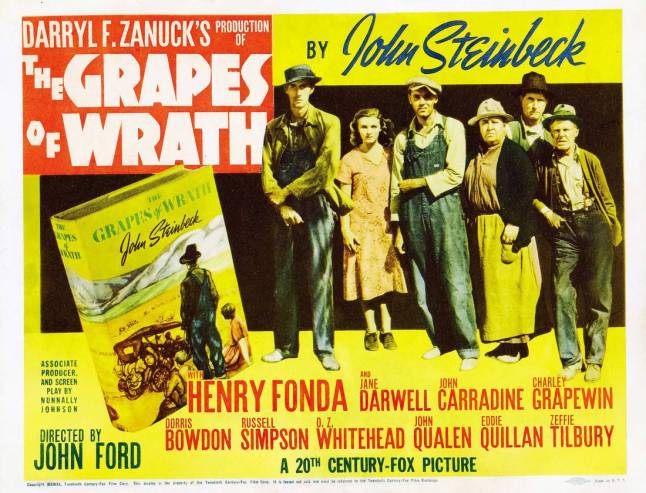John Steinbeck
The Grapes of Wrath
Published in 1939
Read from December 18th 2015 to January 21st 2016
My love for Steinbeck continues to grow, and now that I’ve at last read Grapes of Wrath I can finally call myself a true fan of his. Often considered his greatest work, and which he won the Pulitzer Prize for, it truly is one of the great American novels, and after reading it I understand and approve of all the recognition and praise it has gotten over the years, but also the controversy it has stirred. And it sure has stirred up quite a lot.
Steinbeck does not go easy on those he hold responsible for the migrant worker’s hardships during the Great Depression, he is angry and Grapes of Wrath is thus an angry novel. It points fingers, it lays blame, and it is never doubted whose side we should be on in this conflict. In someways it is therefore understandable how certain people were put off, Steinbeck’s presentation of the time is not neutral, but it sure is passionate. Reactions to to his work varied greatly, it received praise from the critics, won prizes and spent ages on top of the best-seller lists, but it was also banned by school boards and libraries, condemned by right-wing ministers, corporate farmers and politicians, who claimed the work and the author to be communist, immoral and untruthful (DeMott, 2000, p. xxxviii). Exactly the same people who Steinbeck can be said to attack in Grapes of Wrath. Nonetheless, people kept buying the book, and are still doing so to this day.
When looking at the book purely as a work of literature and not as a political instrument, it has been greeted warmly, and received mostly great reviews upon publication, although some critics have criticized Steinbeck for being too sentimental in his writing, and questioning his writing style. I personally find the book extremely well written, and the style suited for the people he represent. Steinbeck very much writes in the “voice” of his characters, which are the migrant workers: not necessarily the most educated, but hard working and resourceful people. It is only natural that should be reflected in the language used. I have to admit though, as a Norwegian reader it’s hard at times to understand some of the most local and old fashioned phrases and word choices, which is one of the reasons The Grapes of Wrath took me a while to finish, but I would never even consider reading this in a translated version. The style of the language is such a crucial element to the work, and makes you connect even more the characters and setting.

An example of “The Grapes of Wrath’s” success: The book was quickly made into a film, already in 1940 John Ford’s directed motion picture was released, starring Henry Fonda. It was instantly a hit.
Another interesting aspect of The Grapes of Wrath’s style is how the chapters are composed. The book presents the family Joad’s story, but in (almost) every other chapter the perspective changes and presents us with a more general view; here we read about the state of the country, the migrant farmers as a whole, see symbolic happenings taking place and similar. DeMott describes the technique as “one which combined a suitably elastic form and elevated style to express the far-reaching tragedy of the migrant drama” and “a contrapuntal structure, which alternates short lyrical chapters of exposition and background pertinent to the migrants as a group with the long narrative chapters of the Joad family’s dramatic exodus to California” (2000, p. xii).
I found this technique to have a brilliant effect, by including the general chapters we truly understand the magnitude of what was going on, it has a greater impact than just one family in a book, and then we are guided back to the Joads which we emotionally connect to and give those we learn about a human voice. The use of this technique also shows that in addition to writing a book about something he was deeply passionate about and that he felt needed to be said, Steinbeck was also experimenting as an author, which is always the sign of a great writer.
Reading The Grapes of Wrath took me all of five weeks, but I’m so glad I took the time. In my opinion it is one of those books everyone should read at some point, and it has made me an ever greater Steinbeck fan than I already was. It quickly made it’s way in to my “favourites”-list on Goodreads, among with East of Eden and Of Mice and Men. As a finish, I’d also like to recommend the John Ford film from 1940, made only a year after the book was published. It’s an excellent adaptation, and mostly true to it’s source material, with some great acting by Henry Fonda.
Sources:
DeMott, Robert (2000). “Introduction” in John Steinbeck, Grapes of Wrath (p. ix-xl): Penguin Classics.
I see you don’t monetize your blog, don’t
waste your traffic, you can earn extra bucks every month because you’ve got hi quality content.
If you want to know how to make extra bucks,
search for: best adsense alternative Wrastain’s tools
LikeLike
I have checked your website and i have found some duplicate content, that’s why you don’t rank high in google’s
search results, but there is a tool that can help you to create 100% unique articles, search for:
Boorfe’s tips unlimited content
LikeLike